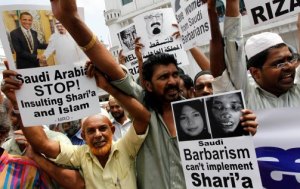 Saudi Arabia has a long history of being a barbaric and primitive state, constantly ignoring internationally agreed laws – especially when it comes to executions of those convicted on flimsy and inaccurate ‘evidence’ in an inefficient and very closed and bigoted legal system.
Saudi Arabia has a long history of being a barbaric and primitive state, constantly ignoring internationally agreed laws – especially when it comes to executions of those convicted on flimsy and inaccurate ‘evidence’ in an inefficient and very closed and bigoted legal system.
The latest execution (at the time of writing) is of a young Sri Lankan woman, Rizana Nafeek, accused of strangling her employer’s 4 month old son.
At the time of the alleged offence, Rizana was 17 years old. Under international law agreements (to which Saudi Arabia has subscribed), persons convicted of an offence committed when they were under the age of 18 cannot be executed.
Her accusers were the parents of the child, who alleged that Rizana strangled the boy after being asked to bottle feed him. The alleged killing of the child took place in 2005 only two weeks after Rizana arrived in Saudi and took up employment. Rizana was to spend the next 7 years in detention, and was sentenced to death on the 16th June 2007. Riyadh’s Supreme Court upheld the death sentence on 25th October 2010, which was later ratified by King Abdullah.
According to an investigation by Amnesty International, Rizana had no access to legal representation during the initial interrogation by police, or during court hearings, she was also prevented from presenting her birth certificate or other proof of age during her trial.
At the time of her interrogation, Rizana had no access to proper interpretation, and although she (according to police) ‘confessed’, she later retracted this account arguing she was forced to make the ‘confession’ under duress following a physical assault. She argues that the baby died in a choking accident while drinking from a bottle.
This disgraceful abuse of human rights by the Saudi regime prompted the involvement of the Sri Lankan President, Mahinda Rajapaksa, who sent an appeal to King Abdullah bin Abdulaziz to at least grant clemency. The Sri Lankan government continued to lobby the Saudis to immediately free Rizana, but the Saudis refused to accept any other view except that of its own flawed court.
Rizana was beheaded on Wednesday 9th January 2013 in Dawadmi, which is about 200 kilometres south of Riyadh.
Her execution has been criticised in the strongest terms by the Sri Lankan government, human rights organisations, and other countries around the world. Sri Lanka has recalled Ambassador to Saudi Arabia Ahmed Jawad with immediate effect. However, the Sri Lankan mission in Riyadh will continue to remain open, providing services to Sri Lankan citizen’s still working in the state.
The Saudis have refused to return the body of Rizana to her home in Sri Lanka.
In a country that still embraces the archaic concept of ‘religious police’ it is not surprising that the execution of Rizana Nafeek took place. With no opportunity for her to defend herself, or to have any kind of reasonable representation or support, accusations made by corrupt zealots go unchallenged. When those zealots are rich and powerful, a poor woman from Sri Lanka had no chance of fair treatment whatsoever, whether the allegation was true or not.
The legal process resulting in death sentences is of concern to human rights organisations.
- Torture is common, and a suspect will be tortured until they ‘confess’.
- Relatives of Saudis and the governments of foreign nationals are often not contacted prior to the execution taking place.
- Defendants are not permitted legal representation during all or part of the legal process.
- Poor immigrants are often abused by Saudi employers and will receive no fair treatment if accused of a capital crime, with courts siding with their own citizens instead of thoroughly investigating and obtaining evidence.
- The number of poor foreign workers sentenced to death has risen significantly in recent years.
- The death penalty is often imposed for non-violent crimes, such as sorcery.
Even though there has been severe condemnation of the Saudi government and their abuse of human rights, business will carry on as usual, and in time the individual atrocities such as happened to Rizana Nafeek will become ‘yet another statistic’.
We are sure that if Saudi Arabia was ‘just another Arab state’ with little buying power, the international community may have more to say about their blatant human rights abuses. But because they have financial influence NOTHING will be done – they can effectively buy their way out of just about any situation.
The Saudis seem quick to pass sentence on poor nationals, but not so quick to apply those same laws to Saudis who abuse alcohol, have sex with numerous women/men (including prostitutes), and commit crime on foreign soil, even though sharia states that they should be punished.
It is incredible that a regime that still appears to exist in the 12th century is allowed to abuse humans without concern.
Anyone with any sense of decency or humanity must find the Saudi regime primitive and disgusting at every level. Nothing matters to them except their own greed and nepotism.
Of course, we are referring to the system and not the people. There are those in Saudi who are repressed and oppose the regime, there are people within the country that want positive change.

